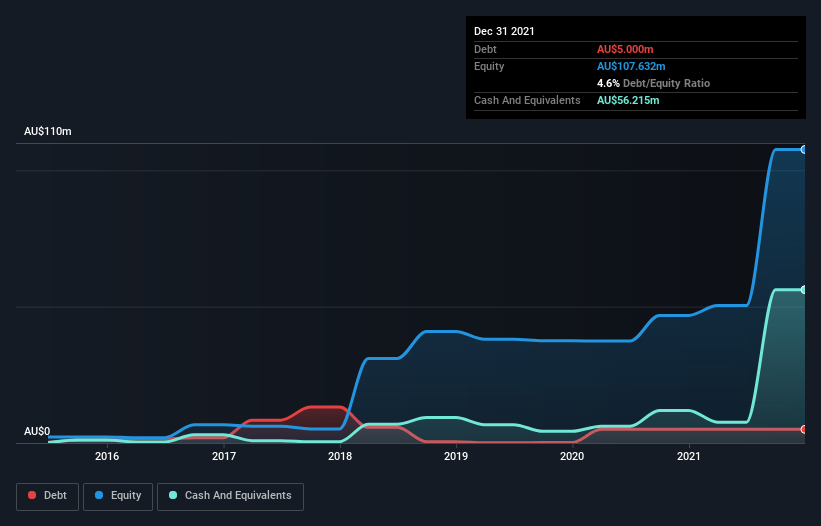Here's Why Lark Distilling (ASX:LRK) Can Manage Its Debt Responsibly
Warren Buffett famously said, 'Volatility is far from synonymous with risk.' It's only natural to consider a company's balance sheet when you examine how risky it is, since debt is often involved when a business collapses. We note that Lark Distilling Co. Ltd (ASX:LRK) does have debt on its balance sheet. But the real question is whether this debt is making the company risky.
Why Does Debt Bring Risk?
Debt is a tool to help businesses grow, but if a business is incapable of paying off its lenders, then it exists at their mercy. If things get really bad, the lenders can take control of the business. While that is not too common, we often do see indebted companies permanently diluting shareholders because lenders force them to raise capital at a distressed price. Having said that, the most common situation is where a company manages its debt reasonably well - and to its own advantage. When we examine debt levels, we first consider both cash and debt levels, together.
See our latest analysis for Lark Distilling
What Is Lark Distilling's Debt?
As you can see below, Lark Distilling had AU$5.00m of debt, at December 2021, which is about the same as the year before. You can click the chart for greater detail. But on the other hand it also has AU$56.2m in cash, leading to a AU$51.2m net cash position.
A Look At Lark Distilling's Liabilities
We can see from the most recent balance sheet that Lark Distilling had liabilities of AU$4.30m falling due within a year, and liabilities of AU$7.29m due beyond that. On the other hand, it had cash of AU$56.2m and AU$4.88m worth of receivables due within a year. So it actually has AU$49.5m more liquid assets than total liabilities.
This surplus suggests that Lark Distilling is using debt in a way that is appears to be both safe and conservative. Given it has easily adequate short term liquidity, we don't think it will have any issues with its lenders. Succinctly put, Lark Distilling boasts net cash, so it's fair to say it does not have a heavy debt load!
Pleasingly, Lark Distilling is growing its EBIT faster than former Australian PM Bob Hawke downs a yard glass, boasting a 568% gain in the last twelve months. The balance sheet is clearly the area to focus on when you are analysing debt. But ultimately the future profitability of the business will decide if Lark Distilling can strengthen its balance sheet over time. So if you want to see what the professionals think, you might find this free report on analyst profit forecasts to be interesting.
But our final consideration is also important, because a company cannot pay debt with paper profits; it needs cold hard cash. While Lark Distilling has net cash on its balance sheet, it's still worth taking a look at its ability to convert earnings before interest and tax (EBIT) to free cash flow, to help us understand how quickly it is building (or eroding) that cash balance. Over the last two years, Lark Distilling saw substantial negative free cash flow, in total. While investors are no doubt expecting a reversal of that situation in due course, it clearly does mean its use of debt is more risky.
Summing up
While it is always sensible to investigate a company's debt, in this case Lark Distilling has AU$51.2m in net cash and a decent-looking balance sheet. And it impressed us with its EBIT growth of 568% over the last year. So we are not troubled with Lark Distilling's debt use. The balance sheet is clearly the area to focus on when you are analysing debt. But ultimately, every company can contain risks that exist outside of the balance sheet. To that end, you should learn about the 3 warning signs we've spotted with Lark Distilling (including 1 which is a bit unpleasant) .
At the end of the day, it's often better to focus on companies that are free from net debt. You can access our special list of such companies (all with a track record of profit growth). It's free.
Have feedback on this article? Concerned about the content? Get in touch with us directly. Alternatively, email editorial-team (at) simplywallst.com.
This article by Simply Wall St is general in nature. We provide commentary based on historical data and analyst forecasts only using an unbiased methodology and our articles are not intended to be financial advice. It does not constitute a recommendation to buy or sell any stock, and does not take account of your objectives, or your financial situation. We aim to bring you long-term focused analysis driven by fundamental data. Note that our analysis may not factor in the latest price-sensitive company announcements or qualitative material. Simply Wall St has no position in any stocks mentioned.

 Yahoo Movies
Yahoo Movies 
